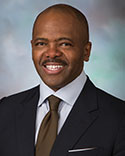
Joseph K. West
Joseph West first felt the sting of racism at age 7.
While out shopping with his mother, West wandered away and started playing with another little boy. Moments later, that boy—who was white—was yanked away by his mother, who scolded her son for playing with West, whom she called the n-word.
"It was so jarring," he says. "The thing I remember the most was the look on that other kid’s face—that realization that he had that there was something wrong with me. And I think I internalized that for years."
West, now the chief diversity and inclusion officer at international law firm Duane Morris, recalls that incident as a precipitating factor for his parents delivering "The Talk"—the harsh introduction many Black parents must give their kids about racism, discrimination and police violence. It’s a conversation West has now had many times with his own children.
"As the father of Black children—with all of the other challenges we have in this day and age of raising our children—the fear that they might lose their lives, particularly at the hands of people charged with protecting them, is such a frightening thought," he says.
In the wake of the killing of George Floyd, those fears kept West up at night—literally. A few weeks ago, around 3 a.m., he decided to put his thoughts to paper and penned a personal reflection on his experiences with racism, the pain of having to pass that onto his children and the role the business world plays in shaping future conversations.
"My intent wasn’t to publish it; it was just cathartic," he says. "I wrote it because I was hurting. I felt for George Floyd, for his family and for so many other families who have experienced what they all did. And I felt for my kids and other Black kids and Black people who frankly received the message that their lives are trivial."
[...]
"A lot of people think what we’re seeing now is the reaction to what happened to George Floyd—that was certainly the spark, but so much of the reaction from people of color is the collective accumulation of years, if not decades, of frustration, anger, the feeling of being diminished," West says. "I was in pain but I published this piece because I knew others were too and perhaps some people could gain some greater understanding from realizing that."
As more non-Black individuals are reckoning with the damage that systemic racism has wielded on society, West sees the potential for the rising intolerance of racism to actually be sustainable. That these conversations are happening in the midst of a global pandemic, West says, could be a positive.
"The pandemic has illuminated to everybody what it feels like to actually fear for your lives when you walk out of the house. I think that’s created a level of empathy for the daily experience of people of color that didn’t exist before," West says.
He says he’s known since he was a teen—when his father delivered another incarnation of "The Talk" after he got his driver’s license—that he faced particular risks simply because he is a Black man.
"And now in the last few months, everybody on the planet knows what it feels like to fear for your life. You can die just from going to the grocery store; most people never knew what that felt like," he says. "But I’d wager every Black person in America has known what that feels like."
[...]
"We’re in an era where a moment can metastasize into a movement," West says.
[...]
Peer pressure is also a motivator. The recent explosion of companies honoring Juneteenth is an example, he says.
[...]
Duane Morris marked the day with a webinar featuring Laurence Fishburne, a star of TV’s Black-ish. Also recently, the firm launched a series of town-hall discussions about racism—germinating from West’s article—featuring West and chairman Matt Taylor. Discussions were segmented by employee level—staff, associates and partners.
[...]
To read the full text of this article, please visit the Human Resource Executive website.







